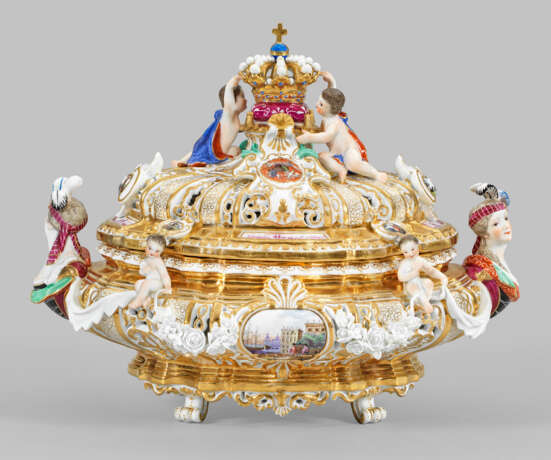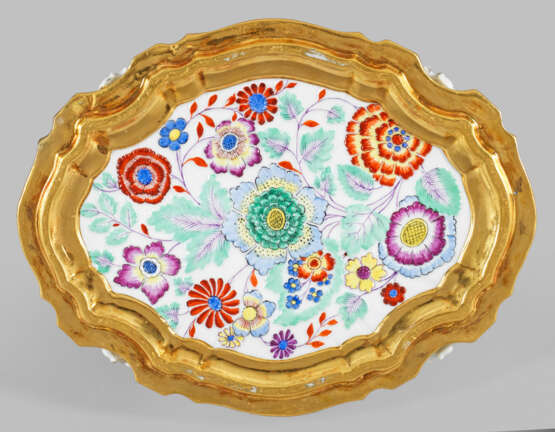ID 1004485
Lot 988 | Kleine höfische Meissen Prunkterrine
Estimate value
€ 18 000 – 36 000
Kleine höfische Meissen Prunkterrine für Maria Josepha von Österreich, Gemahlin von König August III. von Polen
sog. Drüselkästchen. Von vier ausgezogenen Volutenfüßen getragener, ovaler, mehrfach verkröpfter, doppelwandiger und ornamental durchbrochen gearbeiteter Korpus. Seitlich Griffe in Gestalt einer plastischen Frauenbüste mit Federkopfschmuck. Reicher plastischer Dekor aus kleinen Puttenfiguren, verbunden durch Blumengirlanden und Tuchgehänge. Beidseitig der Wandung muschelbekrönte Kartuschen, darin italienische Stadtveduten mit Figurenstaffage.
Korrespondierender Deckel mit vollplastischem Knauf, gestaltet als Königskrone mit Reichsapfel auf Kissen, flankiert von sitzenden Putten. Umlaufend aufgelegte Rocaillekartuschen, darauf die Darstellung des polnisch-litauischen Königswappens mit dem kursächsischen Wappen im Wechsel mit galanten sowie jagdlichen Szenen. Deckelunterseite mit farbenprächtigem Blumenrelief. Polychrome Malerei und reicher Golddekor. Innenwandung vergoldet. Entw. Johann Joachim Kaendler. Modell-Nr. B 136. Minim. rest.; Schwertermarke. H. 20,5 cm.
Die vorliegende Ausformung entstand nach dem Modell eines Drüselkästchens, das Maria Josepha von Österreich (1699 - 1757), Gemahlin von König August III. von Polen, bei Johann Joachim Kaendler bestellte. Dieses Kästchen in Form einer Prunkterrine diente zum "Aufbewahren ausgezupfter, zu Stickereien und dergleichen zu verwendender Fädchen".
Vgl. Zimmermann, Meissner Porzellan, 1924, S. 140. Ducret, Porzellan des 18. Jhs., Abb. 16, S. 31.
A small splendid decorated porcelain tureen, originally for Maria Josepha of Austria, wife of king August III of Poland. Minor restored. Crossed swords mark.
Meissen. Ende 19. Jh.
| Address of auction |
Kunstauktionshaus Schloss Ahlden GmbH Große Str. 1 29691 Ahlden(Aller) Germany | ||||||||||||||
|---|---|---|---|---|---|---|---|---|---|---|---|---|---|---|---|
| Preview |
| ||||||||||||||
| Phone | +49 5164 80100 | ||||||||||||||
| Buyer Premium | 25.0 | ||||||||||||||
| Conditions of purchase | Conditions of purchase | ||||||||||||||
| Business hours | Business hours
|




